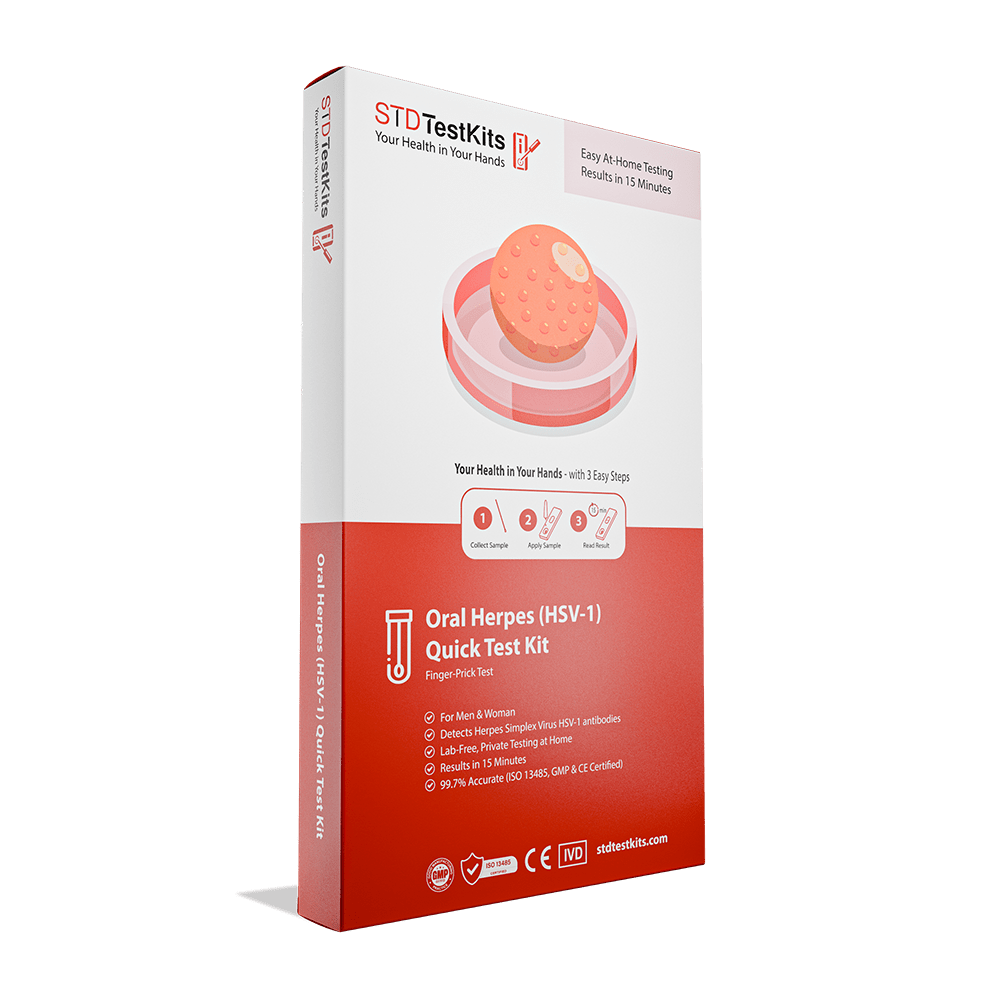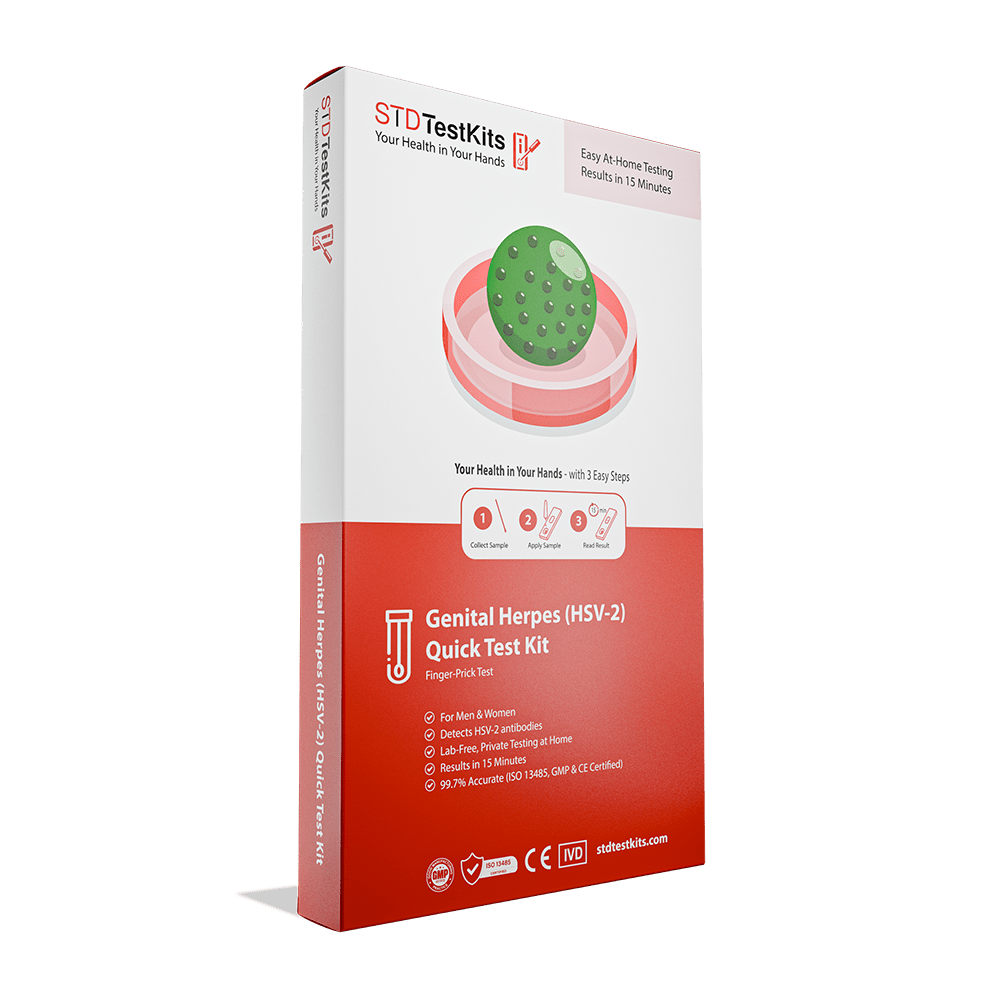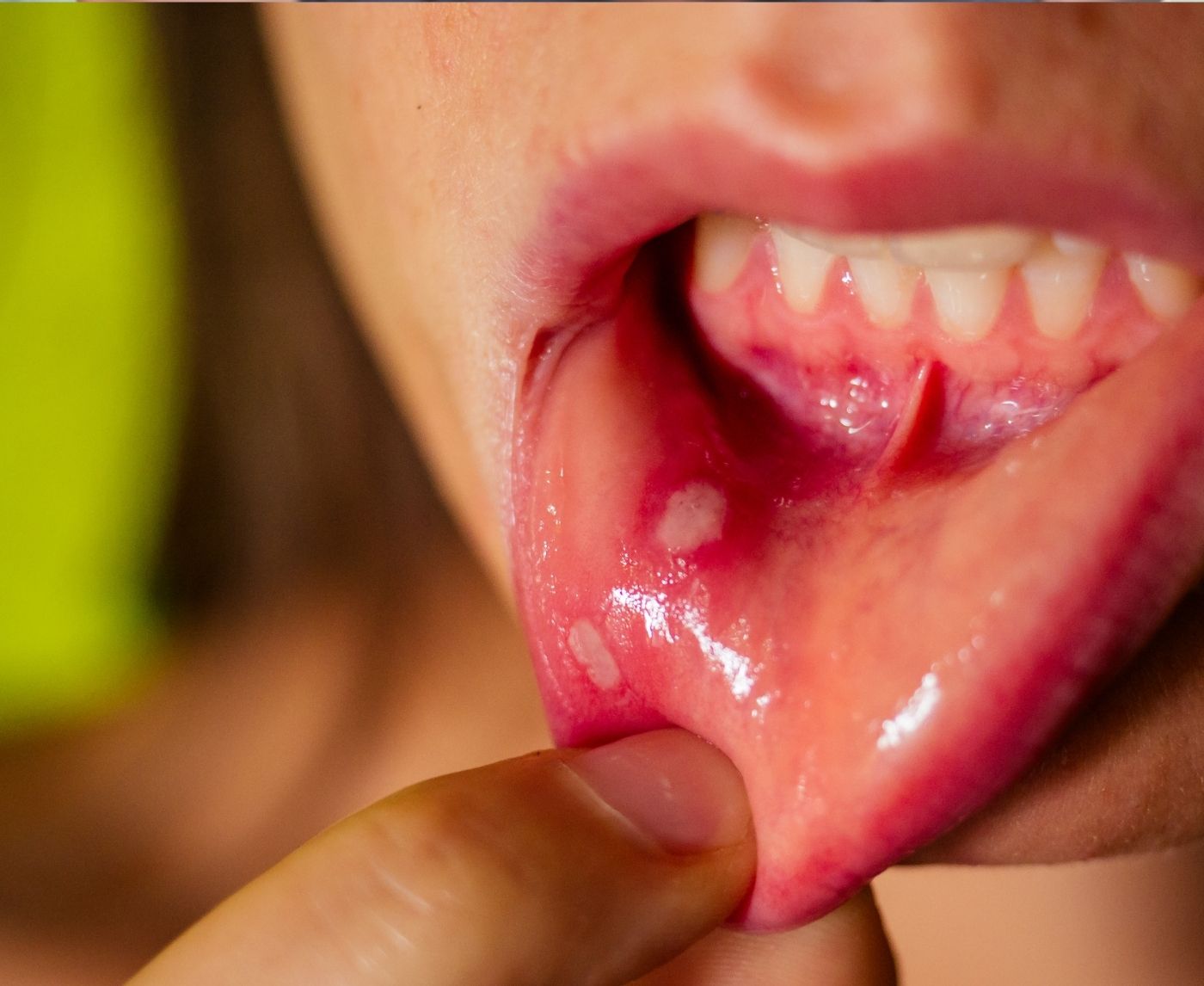Does Herpes Always Mean Sores? Here's When It Doesn't
Quick Answer: Genital herpes symptoms often begin with mild itching, tingling, or skin sensitivity, especially in the genital or inner thigh area, long before any blisters or sores appear. These early signs are easy to miss or mistake for other things.
Who This Guide Is For (And Why It Matters)
If you're reading this, chances are you’ve felt something and didn’t know what to make of it. Maybe you brushed it off as heat rash. Maybe it was a random bump after sex that didn’t look serious. Or maybe you’ve been dealing with recurring “yeast infections” that never quite add up. This guide is for anyone who suspects something’s not right, but isn’t sure what to call it.
It’s also for the folks who’ve been told, “You’d know if you had herpes,” only to find out later they didn’t. Because here’s the thing: herpes doesn’t always follow the rules. It can be invisible. It can be misdiagnosed. It can show up on people who’ve only ever had one partner, or who used protection every time.
If you’ve got a vulva, your symptoms might hide inside the vaginal canal. If you’ve got a penis, they might just feel like an ingrown hair near the base. And if you’re queer, nonbinary, trans, or don’t see your experience reflected in most STD guides, you deserve better. This guide is here to give it to you.
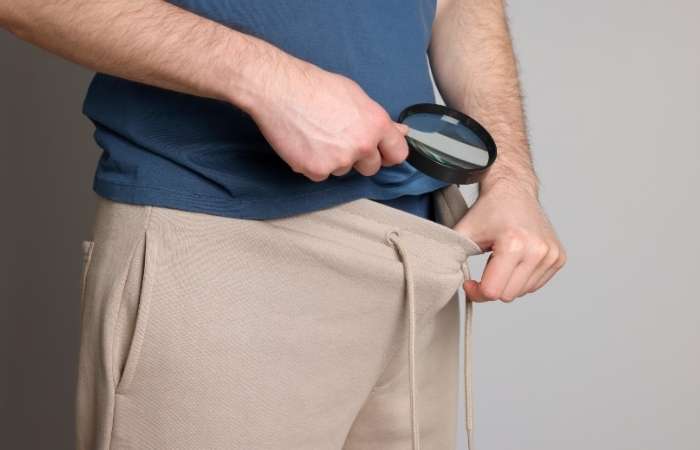
People are also reading: How to Use an HPV Rapid Test
What Actually Counts as an STD Test?
Let’s get one thing straight: not all STD tests are created equal, and not all clinics routinely test for herpes. In fact, most standard STI panels *don’t* include it unless you ask. That’s partly because herpes testing is more complicated, it requires either a swab of an active sore (which many people never develop) or a blood test for HSV antibodies, which can take weeks to show up after exposure.
The most common herpes tests include:
- Viral swab (PCR) , Used when there’s a visible sore. It’s accurate, but only if the sore is fresh.
- Blood test (IgG antibodies) , Tells you if you’ve ever been exposed, but doesn’t say when. Can give false negatives early on.
- At-home herpes rapid tests , These are finger-prick antibody tests you can do yourself. Fast and private, but they still rely on your body having mounted an immune response.
That means if you’re in that early “tingle” phase, you might not test positive, yet. Timing matters. But testing still gives you a starting point. You can explore testing options here or go straight to a discreet Herpes 1/2 rapid test kit if you’re ready for answers without the clinic stare-down.
Symptoms That Don't Look Like Herpes (But Might Be)
These are common early signs of genital herpes that are often mistaken for less serious conditions.
When Silence Is a Symptom Too
Let’s bust a myth: just because you don’t see a sore doesn’t mean you’re in the clear. Around 70% of people with genital herpes don’t realize they have it. That’s not because the virus is hiding, it’s because the symptoms don’t look like what we’ve been taught to expect. No big pus-filled blisters. No obvious “outbreak.” Just vague irritation. Maybe some burning while you pee. Maybe a weird little nick near your underwear line that you figured was from shaving.
Case example: Adriana, 26, had been having what she thought were yeast infections every few months. Discharge, itching, slight swelling, but her tests always came back negative. It wasn’t until a provider did an internal exam during an outbreak that she was told: “This might be herpes.” She had no idea.
Here’s the deal: the early signs can feel like anything and everything else. Razor burn. Heat rash. A pimple. An allergic reaction to lube. Even anxiety can cause tingling. But herpes has a signature move, recurrence. If it keeps happening in the same spot, or follows a pattern, your body might be trying to tell you something.
And if you never get symptoms at all? You’re still contagious. Asymptomatic shedding is real. That’s why regular testing and honest communication matter, even if you feel totally fine.
Why Herpes Symptoms Look Different in Women vs Men
Genital herpes plays out differently depending on anatomy, and those differences are part of the reason so many people miss the signs. It’s not just about who you sleep with. It’s about where the virus goes and how your body reacts.
People with vulvas may have:
- Internal lesions on the cervix or vaginal wall (not visible from the outside)
- A little swelling, tingling, or pressure that feels like a yeast infection or urinary tract infection
- Red spots, small cuts, or pain when you pee
Those with penises may notice:
- Sores or blisters on the shaft, scrotum, or thighs
- Red bumps that look like pimples or hairs that have grown into the skin
- Itching or tingling on one side of the glans or groin
But here's the catch: these symptoms don't always show up the same way. And some outbreaks are so mild that people think they are bug bites or friction burns.
Case example: Ty, 33, first noticed a patch of dry skin on his inner thigh after a hiking trip. He thought it was chafing from his shorts. The next week, it turned into a cluster of tiny blisters, and by then, his partner had symptoms too.
It’s not about blame. It’s about learning what to look for. And sometimes, the signs don’t scream, they whisper. Learning to hear them can protect both you and your partners.
If your body’s sending you mixed messages, don’t guess. Get a definitive answer with a discreet Herpes 1 & 2 test kit. Results in minutes, no clinic drama, no waiting room anxiety.
Herpes Symptoms by Anatomy
What a First Outbreak Really Feels Like (Day by Day)
No two people experience herpes the same way, but if you’ve ever wondered, “Wouldn’t I know if I had it?” this breakdown might surprise you. The first outbreak can be intense… or so subtle you don’t connect the dots until much later.
- Day 1–2: You feel an odd tingle. Maybe a slight itch. Nothing alarming. It could be dry skin, a new detergent, or friction from underwear. Most people don’t think twice.
- Day 3–4: A small patch of redness appears. For people with vulvas, it may feel internal, like pressure or a dull ache. For penis-owners, it might show up as a pimple-like bump. There’s often no pain, just weirdness.
- Day 5–6: Blisters may form, tiny, clustered, and clear. They might pop or turn into shallow ulcers. This is when some people first realize, “This might not be razor burn.” But others still dismiss it as irritation.
- Day 7–10: The area begins to scab over. Pain can increase, especially when peeing. Flu-like symptoms (fatigue, low fever, swollen glands) may appear, especially during the first-ever outbreak.
- Day 11–14: Things start to heal. The skin re-epithelializes. You feel mostly back to normal, but emotionally? You’re now questioning everything.
If this sounds familiar, especially if it’s happened more than once, it’s worth testing. Even if the current outbreak has healed, an antibody test can still detect the virus after the fact.
Herpes That Hides: When It’s Misdiagnosed or Missed
One of the most frustrating truths about genital herpes? It often gets misdiagnosed. Even by professionals. That’s because early symptoms overlap with a dozen other things: yeast infections, bacterial vaginosis, razor burn, allergic reactions, hemorrhoids, UTIs, you name it.
What makes it even trickier? The stigma. Many people are scared to even say the word “herpes,” let alone ask to be tested for it. So they delay care. Or their doctor doesn’t swab. Or the window period messes with the result.
Real talk: A shocking number of people find out they have herpes only after a partner gets diagnosed. And it sucks. Not because they were careless, but because they genuinely didn’t know.
If you’ve ever heard one of these phrases, it’s time to reframe them:
- “If you had herpes, you’d know.” → Not true. Many don’t.
- “It’s just a friction bump.” → Maybe. Or maybe not.
- “You’re clean. Everything came back negative.” → Herpes isn’t always included in routine tests.
You deserve real answers, not assumptions. Especially when it comes to something as common and misunderstood as herpes.
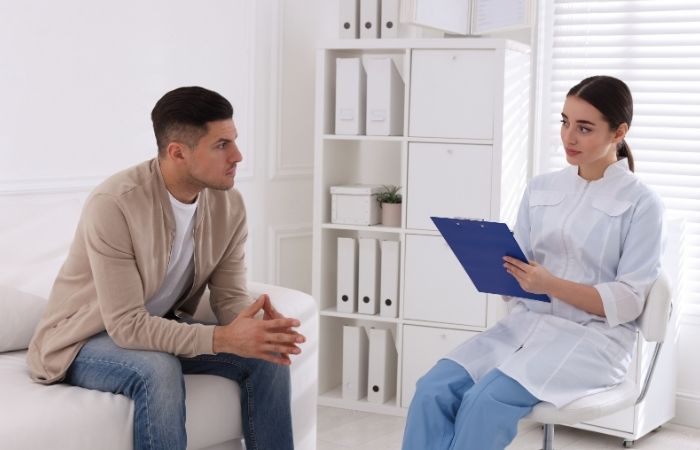
People are also reading: How Dating Apps Changed STD Transmission Forever
How to Talk About It (Without Falling Apart)
Here’s the hardest part, and the most human one: telling someone else. Whether it’s a new partner, a long-term relationship, or just processing your own diagnosis out loud, the words feel heavy. Like they might change everything.
But you are not your diagnosis. You’re not broken. You’re not dirty. You’re someone who caught a very common virus that affects 1 in 6 adults, and you’re choosing honesty and care.
Start simple: “Hey, I found out I have herpes. It’s really common, and it doesn’t change how I feel about us. I just wanted you to know so we can figure out what this means together.”
Most people respond better than you think. And the ones who don’t? That says more about them than you.
This Isn’t a Life Sentence
It’s a virus, not a verdict. Genital herpes doesn’t mean your sex life is over, or that love is off the table. Most people with herpes go on to have amazing relationships, healthy pregnancies, and really good sex. You just learn a few new tools: timing, communication, maybe antivirals, and you move on.
If anything, this might make you more self-aware, more communicative, more grounded in your body. And that’s not a loss. That’s a win.
If you're ready to stop wondering and start knowing, take the next step today. This at-home test is private, fast, and gives you real answers. Because guessing gets exhausting, and you deserve clarity.
FAQs
1. Can you have herpes and not know it?
Yep, and it’s more common than you think. Most people who have genital herpes either never notice symptoms or chalk them up to something else. That weird little itch? Could’ve been herpes. The spot you thought was an ingrown hair? Also possible. It flies under the radar way more than we talk about.
2. What’s the difference between HSV-1 and HSV-2?
HSV-1 is usually the “cold sore” strain, and HSV-2 is the one more often linked to genital herpes, but both can show up in either place. So yes, you can get HSV-1 down there from oral sex. And yes, HSV-2 can live in the mouth. Viruses don’t care about our labels.
3. How do herpes symptoms show up differently in women and men?
People with vulvas might have internal sores, on the vaginal walls or cervix, so symptoms feel more like burning, pressure, or an invisible UTI. People with penises usually see external signs like tiny blisters or redness. But honestly? Gender isn’t the only variable. Everyone’s body throws different signals.
4. Can you have herpes without sores?
Oh, definitely. Some people just feel tingling, burning, or a vague skin irritation that never blisters. Others might get one small crack or a paper-cut-like mark and never think twice. Sores are just one part of the herpes picture, and they’re not always invited to the party.
5. How long after exposure do symptoms show up?
Anywhere from 2 days to a few weeks. But here’s the kicker: some people don’t get their first outbreak for months or even years after catching the virus. That’s why blaming timelines (or people) often leads to the wrong conclusions. Herpes plays the long game.
6. Is herpes included in a regular STD test?
Sadly, no. Most clinics and labs won’t screen for herpes unless you ask specifically, and even then, they might discourage it unless you’re showing symptoms. It’s frustrating. That’s why at-home herpes tests are a smart move if you’ve got questions and don’t want to wait for someone else to take you seriously.
7. Are at-home herpes tests reliable?
When used after the right window period (usually 4–12 weeks after exposure), they’re surprisingly solid. Most detect antibodies, which your body creates after exposure. They’re not perfect, but they’re way better than guessing.
8. Can I still have sex if I have herpes?
Absolutely. Sex doesn’t stop when herpes shows up, it just gets a little smarter. You’ll learn your triggers, track symptoms, and maybe take meds to reduce shedding. Throw in condoms and good communication, and you can still have a great sex life. Plenty of people do.
9. Can herpes be cured?
Not yet. But it can be managed. Outbreaks usually become fewer and farther between over time. Antiviral meds can help keep things quiet and lower the risk of passing it on. And your body? It’s smarter than you think, it learns to keep the virus in check.
10. Does this mean I’ll never date again?
Not a chance. Dating with herpes is completely possible, and honestly, it can make you a better communicator. The right people won’t run. They’ll ask questions, listen, and maybe even respect you more for being honest. Herpes doesn’t cancel love. Or hookups. Or your future. Promise.
Sources
2. CDC — About Genital Herpes: Mild or Mistaken Symptoms
3. “Atypical Herpes Simplex: An Important Diagnosis to Consider” — PMC
4. Herpes NZ — How Herpes Can Be Mistaken for Pimples or “Cracks” in Skin
5. StatPearls — HSV-2: Underreported and Under-Diagnosed Due to Vague Presentation
6. Verywell Health — Herpes Incubation & Vague Symptoms
About the Author
Dr. F. David, MD is a board-certified infectious disease specialist focused on STI prevention, diagnosis, and treatment. He blends clinical precision with a no-nonsense, sex-positive approach and is committed to expanding access for readers in both urban and off-grid settings.
Reviewed by: Renée Clarke, MSN, WHNP-BC | Last medically reviewed: October 2025
This article is for informational purposes and does not replace medical advice.





